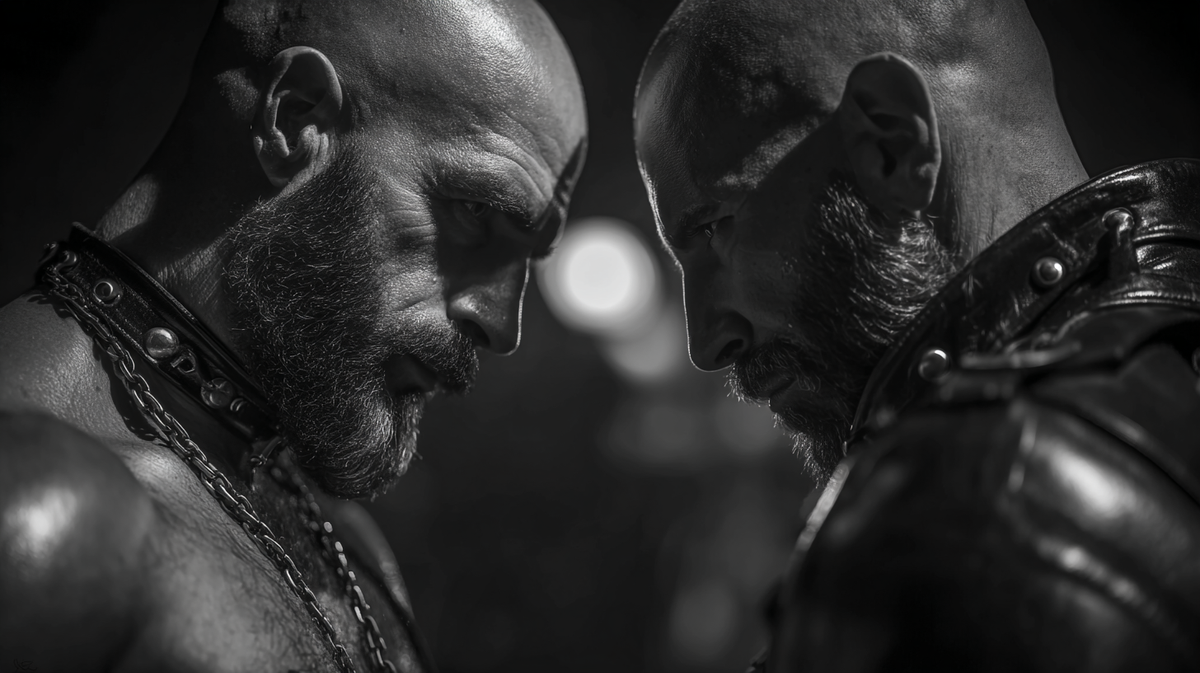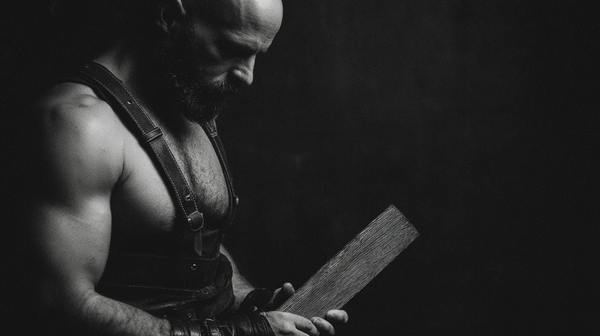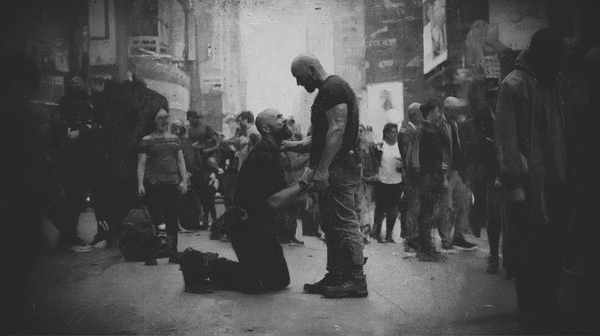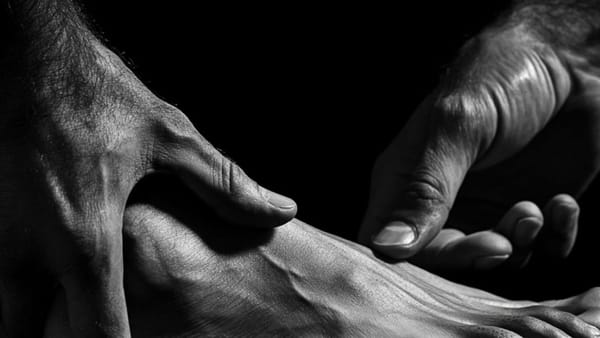Born Or Made?
Are Masters and slaves born or made? I explore this question through psychology, philosophy, and my own journey as a Master. I strongly believe we’re born with a fundamental nature, but it’s through life, training, and surrender that our true nature is revealed.

The question of whether dominance and submission are innate traits or the result of our environment — that eternal nature vs. nurture debate — has haunted me since the moment I first discovered my kink nature.
Are we born to kneel or to command? Or are these roles shaped entirely by our upbringing, by the world we move through and the experiences we gather?
This isn’t just about my perspective. I also want to examine what psychology has to say — from Freud’s primal drives to Jung’s shadow archetypes, Lacan’s mirror stage, Foucault, and beyond.
My Experience: Born or Made?
From my earliest memories, I knew I was an Alpha. One of my first clear sexual awakenings happened as a child, watching a Rambo movie: Rambo silently grabs a soldier from behind, covers his mouth, subdues him completely. That moment of absolute control ignited something deep inside me. Even though I was raised in a strict, military family, my childhood was happy and free from explicit kink influences.
I never once questioned my place in the hierarchy. The mere idea of being submissive was as absurd to me as being with a woman or having vanilla sex.
Throughout my years as a Master, I’ve had the privilege of meeting and training many submissives, dominants, slaves, and Masters. Over time, it became obvious to me that some individuals are simply born slaves. Take my current slave, beast, as an example. Even before I began his training, he instinctively behaved like property: walking one step behind, offering to carry my bags, and — without needing to be told — addressing me in Spanish using the formal second person “usted” instead of “tú”. These are not learned gestures — they reveal a nature waiting to be claimed.
I believe that while societal dynamics and “nurture” certainly play a role in shaping us, they do not create these core instincts from nothing. Rather, our societies reflect and echo our primal, animal drives — dominance and submission exist because they mirror who we already are beneath the thin veil of civilization.
Still, I recognize that being “born” a slave or Master isn’t enough on its own. Many slaves never fully awaken because they never meet the Master who unlocks that potential. In this way, nurture is crucial: we may be born with a certain nature, but it is only through the right experiences, the right hands guiding us, that this nature fully emerges.
But what does Philosophy and Psychology say about this?
Hegel’s Master-Slave Dialectic
Long before modern psychology tried to explain why some of us crave to dominate or submit, the philosopher Hegel proposed a powerful idea about how we become who we are. In his Phenomenology of Spirit, he describes what happens when two self-aware individuals meet. Each wants to prove he is independent, strong, and fully himself. This creates a struggle to be recognized as the “true” self by the other.
In this clash, one individual decides to risk everything to prove his superiority. The other, unwilling to face total destruction, submits to survive. Through this act, the one who risked all becomes the Master; the one who yielded becomes the slave.
But here’s the important part: neither the Master nor the slave existed in these roles before the confrontation. They become who they are through each other. The Master can only see himself as a Master because someone else submits to him. The Slave discovers his own self and purpose by serving and working under the Master’s gaze. This is what Hegel called “mutual recognition.”
This dynamic resonates deeply with many D/s relationships. A Dominant is not fully “Dominant” without someone to dominate; a slave only becomes a slave through surrendering to a Master’s will. They shape each other’s identities through this bond.
Still, in my experience, many slaves feel their calling to serve long before they ever meet a Master, and vice versa. Hegel’s theory beautifully explains how roles crystallize in relationship, but it doesn’t fully capture that primal yearning some individuals carry inside them — a need to submit.
What does Psychology say?
Freud: The Unconscious Blueprint of Submission and Domination
Freud believed we are shaped, above all, by the unconscious — the hidden realm where early conflicts with authority figures leave indelible marks.
As children, we first confront power in the figure of our parents. We crave their love, fear their punishment, and learn to negotiate our desires through submission or rebellion. This primal dynamic becomes the mold for all future power relationships.
For Freud, our need to dominate or submit later in life isn’t a “choice” but the return of repressed desires. The submissive craves approval and punishment to resolve buried guilt. The Dominant reenacts early assertions of power, channeling repressed aggression or unmet desires to control.
Born or made? Freud leaned toward made.
Jung and the Call of the Shadow
(Note: A fascinating book that explores Jung’s theories in the context of kink and BDSM is The Deep Psychology of BDSM and Kink).
Carl Jung, unlike Freud, believed that inside all of us there’s a “shadow” — parts of ourselves that we usually hide or don’t fully accept. He thought that to become truly whole, we need to face and embrace these hidden parts instead of pushing them away.
If we look at Dominance and submission through Jung’s ideas, they aren’t just things we learn from the outside world or copy from others. They come from deep, universal patterns inside us — what he called archetypes. For example, someone’s desire to dominate might connect to an inner “king” or “warrior” part of them. On the other hand, the urge to submit could reflect an inner “lover” or “devoted servant.”
Born or made? Jung would say it’s both: these instincts exist deep inside us, but we discover and shape them through our lives (I pretty much agree with this theory myself).
Evolutionary Psychology: Hierarchies in Nature
Evolutionary psychology looks at human behavior through the lens of survival and reproductive advantage. In this view hierarchies are natural and widespread in social animals, from wolves to primates. There’s often an “alpha” who asserts dominance and “subordinates” who submit to maintain group cohesion.
Humans, as social mammals, have evolved a predisposition to establish and navigate hierarchies. Dominance and submission thus become instinctual strategies to reduce conflict and create order.
Individual variation — why one person craves dominance while another seeks submission — could be explained by evolutionary diversity: different roles strengthen the group’s adaptive capacity.
Born or made? Leaning toward born.
Lacan and the Mirror of Desire
Lacan believed that our sense of self — our identity — is not something fixed that we’re born with. Instead, it is formed through a lifelong process of “mirroring” and interaction with others. For him, we understand who we are by seeing ourselves reflected in the eyes and reactions of others.
As you would notice, Lacan was deeply influenced by the Hegel’s Master-Slave dialectic explained above.
When we talk about the roles of Master and slave, Lacan would argue that these are not pre-existing categories that people simply fit into from birth. Instead, these roles are positions that emerge in the complex structure of human desire and social relations. We become Master or slave through repeated actions, choices, and interactions that solidify this identity over time.
While Lacan acknowledges that someone might feel a “pull” toward submission or domination, he wouldn’t describe this as a purely inborn trait. Instead, he would see it as a psychic position one inhabits — a structure someone steps into because it resonates with their unconscious desires.
Born or made? Made. In this view, no one is born a Master or a slave — these are positions we grow into, shaped by our experiences, our interactions, and the deep human need for meaning, recognition, and place within a hierarchy.
Foucault and Power Structures
Michel Foucault analyzed how power circulates within societies — not as something possessed by a few, but as a network of relationships and practices that shape individuals. For Foucault, identities (like Master or slave) are not fixed or purely personal choices; they are created and maintained through complex social power dynamics and discourses.
He argued that desire and sexuality are deeply connected to power. Practices of discipline and surveillance — central to kink dynamics — reflect broader social mechanisms that control and shape bodies and minds.
In Foucault’s framework, it’s not that someone naturally is a Master or a slave. Rather, they “become” one through social inscription: A person might be drawn to the pleasures of control and see power as affirming their identity — and thus embody the Master role. Another might be captivated by surrender and the eroticism of being acted upon — becoming a sub or slave.
Born or made? Decidedly made, according to Foucault. There is no “true” Dominant or submissive waiting to be discovered.
Others...
Beyond these major theories, approaches like humanistic psychology, behaviorism, and attachment theory suggest that our roles as Masters or slaves are shaped by a complex mix of early relationships, reinforcement, and existential choices. While these perspectives emphasize nurture over nature, they agree on one thing: it is through our experiences and encounters that our deepest truths come alive.
Conclusion: Born or Made?
So, who’s right? Are we born this way, or do we become this way?
The truth, as always, is more complex than any single theory. Modern psychology largely agrees: our behaviors and identities are neither purely innate nor purely shaped by our environment — there's an intricate dance between both.
In my own experience, this resonates deeply. I believe we carry within us a certain predisposition — a primal thread woven into our being. Some of us are born with an instinct to lead, to dominate, to claim; others with a profound pull toward surrender, service, and obedience. Perhaps these are echoes of ancient evolutionary roles meant to ensure order, cohesion, and survival within the group.
But that primal seed alone is not enough. It is through life — through encounters, rituals, experiences, social structures, and repeated acts — that this buried nature rises to the surface. No one is simply born a Master or a slave in full form; one must discover it, embrace it, and transform it into identity through action and connection.
In the end, it is not about drawing rigid lines between “born” and “made,” but understanding that both forces shape who we are. We may be destined to lead or to kneel, but it is only when we step onto the stage of life and meet the eyes of the other that our true nature is fully revealed — and ultimately, fulfilled.




